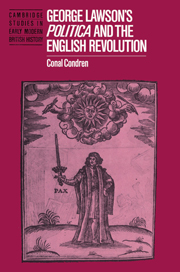Book contents
- Frontmatter
- Contents
- Preface
- Texts used and a concordance for the ‘Politica’
- List of abbreviations
- PART I Historiographical And Biographical Preliminaries
- PART II An Exposition Of Lawson's Politica
- PART III An Examination Of The Politica
- PART IV The Fate Of The Politica From The Settlement To The Glorious Revolution
- 11 Lawson and Baxter
- 12 Lawson and Humfrey
- 13 The Politica and the Allegiance Controversy
- 14 Aftermath
- PART V Conclusions
- Index
- Cambridge Studies in Early Modern British History
13 - The Politica and the Allegiance Controversy
Published online by Cambridge University Press: 04 November 2009
- Frontmatter
- Contents
- Preface
- Texts used and a concordance for the ‘Politica’
- List of abbreviations
- PART I Historiographical And Biographical Preliminaries
- PART II An Exposition Of Lawson's Politica
- PART III An Examination Of The Politica
- PART IV The Fate Of The Politica From The Settlement To The Glorious Revolution
- 11 Lawson and Baxter
- 12 Lawson and Humfrey
- 13 The Politica and the Allegiance Controversy
- 14 Aftermath
- PART V Conclusions
- Index
- Cambridge Studies in Early Modern British History
Summary
In 1689 some nineteen works were reprinted from earlier times. Buchanan's De iure and the Vindiciae contra tyranos reappeared from the sixteenth century; five works originally printed in the period of the Monmouth Rebellion set a precedent for Locke's Two Treatises; Hunton's Treatise of Monarchy was reprinted twice; works by Ascham and Milton from 1649 reappeared together with ones by Sancroft, Sexby and Hammond from 1657. But from the largest print year of them all, only Lawson's Politica reappeared in a new quarto format.
All these works had a role somewhat different from the bulk of materials directly generated by the controversy. Obviously the most immediate question of the controversy concerned allegiance to the new regime. Answering this, however, depended largely on the prior characterisation of the various royal comings and goings; and indeed even on the question of who had acted, with God always lurking off-stage left or right (delete according to political prejudice). Any specification of events more informative than exit pursued by an Orange carried with it a range of ethical and political injunctions and pre-empted answers to those immediate questions of allegiance, legitimacy and settlement, which have attracted so much attention. It was largely the predication of events that divides the literature of allegiance, and the older, republished works are important because they helped provide conceptual frameworks through which the very recent past could be assimilated in a way appropriate to one's cause.
- Type
- Chapter
- Information
- George Lawson's 'Politica' and the English Revolution , pp. 151 - 165Publisher: Cambridge University PressPrint publication year: 1990



